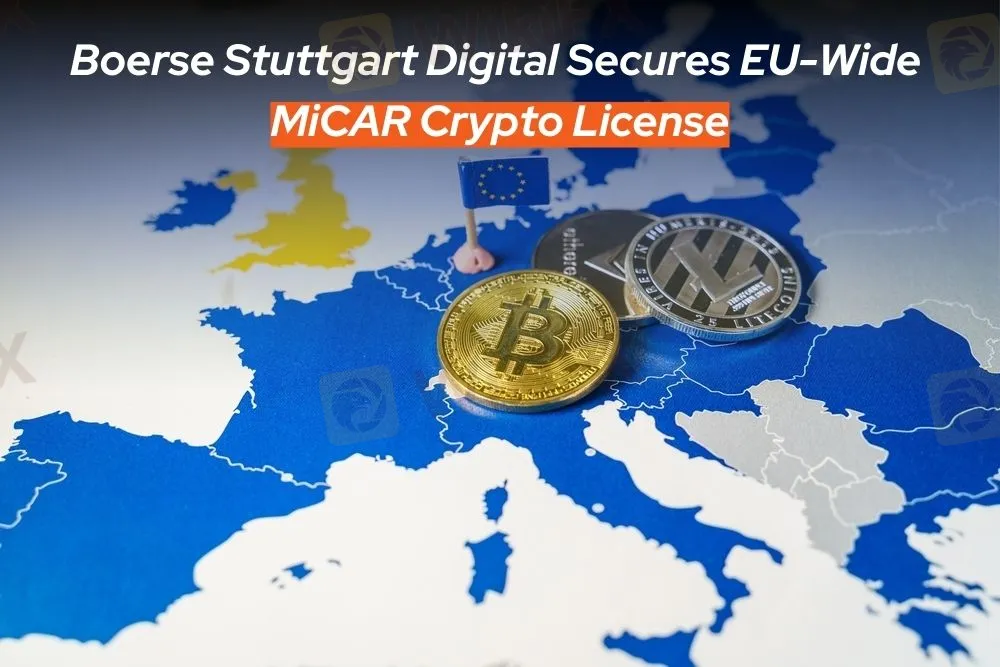Boerse Stuttgart Digital Secures EU-Wide MiCAR Crypto License
Abstract:Boerse Stuttgart Digital secures Germany’s first MiCA license, enabling EU-wide operations and expanding its digital asset services.

Boerse Stuttgart Digital, a subsidiary of Germany‘s second-largest stock exchange, recently became the first German entity to secure a crypto-asset service provider (CASP) license under the EU’s Markets in Crypto-Assets (MiCA) regulations. This license, awarded by the Federal Financial Supervisory Authority (BaFin), enables Boerse Stuttgart Digital to operate across all EU member states, marking a significant milestone in the companys journey towards digital asset expansion.
Regulatory Challenges and Breakthrough
The implementation of MiCA regulations across the EU aims to create a consistent framework for crypto-asset services. However, Germanys adoption faced delays due to political instability, including the collapse of the coalition government. This left legislative gaps, such as the formal designation of BaFin as the MiCA regulator. Just before the 2024 holiday season, the Bundestag passed the necessary laws, allowing BaFin to issue the CASP license.
Building on Institutional Ties and Expanding Offerings
A key factor in Boerse Stuttgart Digital‘s success is its collaboration with institutional partners like DZ Bank, Germany’s second-largest financial institution. This partnership supports the rollout of crypto services to 737 German community banks, with pilot projects already underway. The companys ability to bridge traditional banking and digital assets showcases its commitment to advancing the financial ecosystem.
According to Dr. Matthias Voelkel, CEO of Boerse Stuttgart Group, the company is working to develop integrated solutions for financial institutions across Europe. By building on its expertise, the firm aims to scale its operations while meeting the growing demand for secure and efficient digital asset services.
Read more

$TRUMP Token Soars: A New Era for Trump and Cryptocurrency?
Donald Trump has taken an unexpected step into the cryptocurrency market ahead of his January 20 inauguration by launching a memecoin named $TRUMP. The announcement sparked significant speculation and trading activity, with the coin’s value skyrocketing within hours of its debut.

Crypto.com’s Dual Front Battle: European Progress and U.S. Regulation
Crypto.com has received conditional approval to operate under the European Union’s Markets in Crypto-Assets (MiCA) framework. Once fully licensed, this will enable the company to serve customers throughout the EU under a standardised set of rules.

Binance’s Bold Move: 12 Trading Pairs Are Getting Delisted
Binance, one of the world’s largest cryptocurrency exchanges, will remove 12 spot trading pairs from its platform on January 17, 2025, at 03:00 (UTC).

BitMEX Fined $100M in U.S. for Anti-Money-Laundering Violations
BitMEX fined $100M for anti-money laundering and KYC violations. The case highlights the U.S. crackdown on crypto platforms ignoring Bank Secrecy Act rules.
WikiFX Broker
Latest News
Will Gold Prices Continue to Rise Due to Trump’s Tariffs?
Miami Firm Owner Pleads Guilty to $6M Ponzi Scheme Fraud
eToro Files for IPO with $5 Billion Valuation on NASDAQ
NBI Cebu Arrests Forex Trader for Illegal Investment Solicitation
PU Prime's "Feather Your Trades" Contest! Begin
Is FizmoFX a Scam? Fraud and Account Suspension of Traders
Why the Federal Reserve Is So Important
Boerse Stuttgart Digital Secures EU-Wide MiCAR Crypto License
BOJ to Announce Policy Decision This Week, Market Bets on a Rate Hike
Crypto.com’s Dual Front Battle: European Progress and U.S. Regulation
Rate Calc

